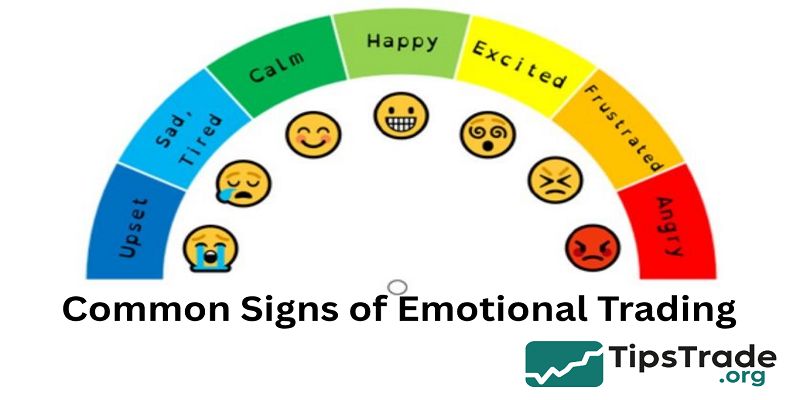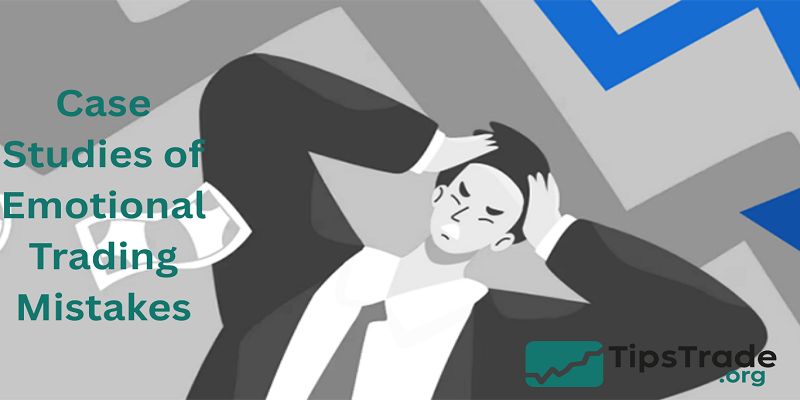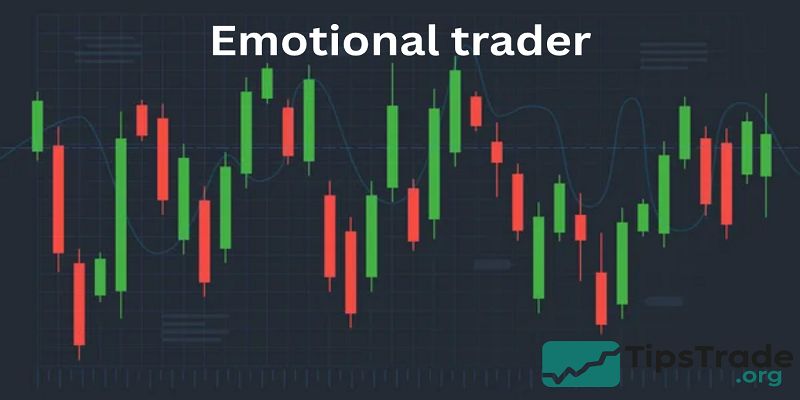Emotional trader is someone who makes decisions based on fear, greed, or stress instead of logic and strategy. This mindset is one of the top reasons why more than 75% of retail traders lose money according to ESMA (European Securities and Markets Authority). While technical analysis and risk management tools are important, mastering your emotions is often the deciding factor between consistent profits and repeated losses. This article explains what an emotional trader is, the common traps caused by emotions, and practical strategies to avoid them.
What is an Emotional Trader?

- An emotional trader is someone whose buying and selling decisions are driven by psychological impulses rather than objective analysis.
- For example, when prices fall sharply, an emotional trader might panic and sell at the bottom.
- When prices rally, they may rush in due to FOMO (Fear of Missing Out), often buying at the top. Emotional traders often ignore trading plans, neglect stop losses, and rely on “gut feeling.”
- Research in behavioral finance highlights that humans are not always rational. Nobel Prize winner Daniel Kahneman showed that cognitive biases, like loss aversion, push traders to act irrationally.
- Unlike disciplined traders who stick to pre-set strategies, emotional traders are reactive and inconsistent.
- They may feel euphoria after a win and despair after a loss, leading to cycles of revenge trading or overtrading.
The distinction between an emotional trader and a disciplined one lies in structure: a professional trader has a trading plan, risk rules, and journal, while the emotional trader operates without guardrails.
>>See more:
- What is Forex? The Complete Guide for Beginners
- Learn Forex – Beginner’s Guide to Start Trading Successfully
- List of Top forex brokers in 2025 – Most Trusted and Reliable
- Forex Capital Management Tips: The Key To Success For Professional Traders
Common Signs of Emotional Trading

-
Overtrading Due to Greed: Greed is a powerful market emotion causing traders to take excessive risks after winning trades, expecting streaks to continue. For example, after earning a 20-pip profit in forex, a trader may double the risk on the next trade, ignoring set risk rules. This leads to overexposure and often large losses or account wipeouts.
-
Panic Selling from Fear: Fear causes traders to sell too early or at losses, especially during negative news like interest rate hikes. Instead of waiting for confirmation, emotional traders dump positions at the first sign of downturns, crystallizing avoidable losses.
-
Revenge Trading After Losses: After a loss, emotional traders try to immediately “win back” money by placing impulsive, oversized trades. This aggressive response raises risk levels instead of analyzing and learning from mistakes.
-
FOMO (Fear of Missing Out): This leads traders to chase market trends impulsively, buying at inflated prices just because “everyone else is making money.” This is common in volatile markets like crypto during bull runs and often results in buying near tops and heavy losses.
These emotional trading patterns share common behaviors such as ignoring trading plans, breaking risk management rules, and reacting to short-term market movements instead of logical analysis. Recognizing these signs early through self-awareness, journaling, and emotional checks can help traders avoid costly mistakes and move towards more disciplined trading.
Why Emotions Hurt Trading Performance

Emotions distort perception and lead to irrational behavior. Studies in neuroeconomics reveal that when fear or greed activates the amygdala (the brain’s emotional center), logical reasoning in the prefrontal cortex is suppressed.
This is why traders act impulsively during stress.
- Fear leads to hesitation, premature exits, and missed opportunities.
- Greed leads to ignoring stop-losses, chasing profits, and oversized positions.
- Hope causes traders to hold losers longer than winners.
Regret fuels second-guessing and lack of confidence.
In fact, a 2020 study from the Journal of Behavioral Finance found that traders who practiced emotional regulation earned 23% more consistent returns than those who relied on intuition. Emotional traders are also more vulnerable to the “herd mentality,” following crowds without objective analysis.
How to Avoid Being an Emotional Trader

-
Develop a Trading Plan: Creating a clear trading plan is essential. It should include rules for entry and exit points, position size, and risk limits before trading starts. Having this roadmap reduces impulsive decisions when emotions rise, helping stick to a logical strategy.
-
Use Stop Loss and Take Profit Orders: These mechanical orders automatically limit losses and secure profits without emotional interference. Brokers like MetaTrader and TradingView recommend using stop-loss orders to protect capital and take-profit to lock gains.
-
Keep a Trading Journal: Writing down each trade along with the rationale, emotions felt, and outcomes builds awareness of emotional patterns. This helps identify when fear, greed, or other emotions cause bad decisions, making it easier to avoid repeating mistakes.
-
Apply the 2% Rule: Professional traders limit risk to no more than 2% of their capital on a single trade. This rule reduces emotional stress since no single trade can severely damage the account. For example, with $10,000 equity, risking $200 per trade caps potential losses safely.
Additional advice includes filtering market noise by avoiding excessive news or social media, taking breaks after losses to prevent revenge trading, setting daily trading limits to avoid overtrading, and rewarding discipline rather than profits. Using these methods creates emotional resilience and steadiness in decision-making.
Practical Tips for Emotional Control

-
Practice mindfulness or meditation: Mindfulness techniques help to lower stress hormones and increase awareness of your thoughts and feelings, making it easier to trade based on rational decisions rather than emotions. Studies show this improves decision-making under pressure.
-
Set daily trading limits: Define a maximum number of trades per day ahead of time. This prevents overtrading, which often stems from emotional impulses.
-
Take breaks after losses: Stepping away from the screen after a losing trade can prevent “revenge trading,” where you try to quickly recover losses impulsively.
-
Avoid constant news checking: Watching financial news too frequently increases anxiety and can lead to emotional decision-making. Filtering out market noise helps maintain focus.
-
Reward discipline, not profits: Congratulate yourself for following your trading plan and risk management rules, even if a trade results in a loss. Discipline is the real key to long-term success.
Additional strategies include creating personal trading rules for entries, exits, and risk limits; trading only in favorable market conditions; lowering trade sizes to reduce emotional impact; maintaining a trading journal to identify emotional patterns; and applying logic by stepping back to assess your feelings before making decisions.
Techniques like deep breathing and visualization can also help maintain emotional control during trading sessions. Patience and discipline help you avoid impulsive actions driven by fear or greed and stick to your trading plan through ups and downs.
Case Studies of Emotional Trading Mistakes

- Case 1: Panic Selling in Stock Crash
During the COVID-19 crash in March 2020, millions of retail investors sold at historic lows out of fear. Emotional traders locked in losses, while disciplined investors who held or bought saw massive recoveries by 2021. - Case 2: Revenge Trading in Forex
A beginner forex trader lost $500 on EUR/USD. Instead of pausing, he doubled his position size in frustration. Within hours, he lost another $1,200, blowing half his account. This classic revenge trading spiral destroyed his confidence. - Case 3: FOMO in Crypto
In late 2017, Bitcoin hit nearly $20,000. Many emotional traders bought at peak prices. When Bitcoin fell to $6,000 in early 2018, panic selling amplified their losses. Meanwhile, disciplined investors who waited for proper entries gained more in later rallies.
These cases illustrate that emotions, not markets, are the biggest danger to traders.
Tools & Resources to Help Emotional Traders
- Trading Journals: Edgewonk, TraderSync.
- Psychology Books: Trading in the Zone (Mark Douglas), The Daily Trading Coach (Brett Steenbarger).
- Apps for Mindset: Headspace, Calm (for meditation).
- Risk Management Tools: MetaTrader stop-loss automation, Position Size Calculator.
- Communities: Forums like Babypips, TradingView ideas section for peer feedback.
Learning from experts and communities helps emotional traders build discipline and accountability.
Conclusion
Emotions are powerful forces in trading. An emotional trader often sabotages their own success through fear, greed, and lack of discipline. But by building a trading plan, applying risk rules, keeping a journal, and practicing mindfulness, traders can shift from emotional reactions to rational decisions. Markets will always be unpredictable, but your mindset can be trained. The article above from Tipstrade.org has just provided you . We hope that you find it useful. Wishing you successful trading!
>>See more:

